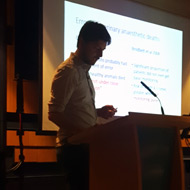Tips for improving patient safety

We must try to reduce error rates by taking responsibility, thinking about why the mistake happened, asking what the contributing factors were and trying to correct the problem and improve conditions.
You need only Google 'preventable patient deaths' to come up with a plethora of news stories about cases of human error leading to avoidable deaths in human medicine.
BSAVA Congress speaker Matt McMillan said there are a "staggering" number of these cases in medicine globally, but there is little data on this in veterinary medicine.
A 2008 study suggested there are anaesthetic or sedation-related deaths in one in every 2,000 healthy dogs. The figure for healthy cats was one in 900.
McMillan is an anaesthetist at Queen's Veterinary School Hospital, with a special interest in patient safety. At this week's congress he told delegates it's important to recognise that entirely avoiding error is impossible and making mistakes does not make you incompetent.
But we must try to reduce error rates by taking responsibility, thinking about why the mistake happened, asking what the contributing factors were and trying to correct the problem and improve conditions.
Common causes of error include stress, fatigue, anxiety, distraction, illness, being overworked or understaffed, time constraints and problem clients or patients, such as aggressive dogs, for example.
In anaesthesia, common errors include forgetting to check the patient, closed APL valve and medication errors, while a key problem in surgery is a lack of communication between the surgeon and the person monitoring the patient.
It is essential not to play the blame game by focusing on one person's actions, however. "Look at conditions not culprits," McMillan said, as he advocated the use of clinical auditing, or monitoring bad outcomes within practice.
A confidential forum for reporting errors and regular meetings can help to examine negative outcomes, but in addition to this, it is important to look at what is going well - what the practice is succeeding at - to see if lessons can be learnt there too.
At McMillan's hospital, a Safety Incident Diary (SID) is used and narrative-based reporting is encouraged to establish the chain of events, contributing factors, ameliorating factors, corrective actions and the outcome. Senior staff need to lead by example in being open about errors with the team, McMillan added.



 FIVP has shared a survey, inviting those working in independent practice to share their views on the CMA's proposed remedies.
FIVP has shared a survey, inviting those working in independent practice to share their views on the CMA's proposed remedies.